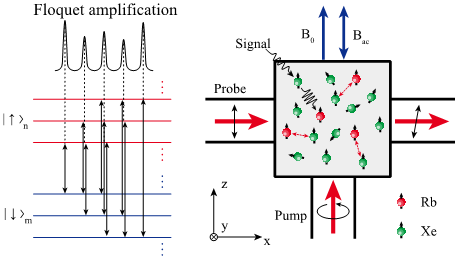Detecting weak signals is an important step in testing physics hypotheses and making major advances in cutting-edge and underlying physics research. Yet, the signals are too weak to be measured and thus require improvement. Quantum amplification is one appealing method of signal amplification.
 Floquet states and the experiment of Floquet spin amplification. Image Credit: Group of Prof. PENG Xinhua.
Floquet states and the experiment of Floquet spin amplification. Image Credit: Group of Prof. PENG Xinhua.
The most advanced quantum amplification methods still have some constraints because they depend on the underlying discrete state transitions of atoms and molecules and thus lack tunability, typically boosting only one signal within a narrow frequency range.
To address this issue, a team of researchers led by Professor Xinhua Peng of the Chinese Academy of Sciences collaborated with Professor Dmitry Budker of the Helmholtz Institution in Mainz to broaden quantum amplification to periodically driven spins. The findings were published in Physical Review Letters.
Time-dependent, periodic Hamiltonians define periodically driven systems, also known as Floquet systems. A Floquet system has energy levels with equal energy gaps, and the system’s state can switch between them via resonance transitions.
The integration of quantum amplification and the Floquet system has the potential to overcome the shortcomings of conventional quantum amplification techniques.
The scientists used an oscillating field to drive 129Xe noble gas regularly. The Hamiltonians of 129Xe spins were then time-periodic, and the system gained extra synthetic dimensions, allowing resonance transitions over a wider frequency range.
Researchers showed the concurrent amplification of multiple weak electromagnetic waves using this 129Xe Floquet spin system in both experiment and theory.
This paper applies quantum amplification to Floquet systems and notices a unique form of amplification phenomenon known as “Floquet spin amplification.”
It solves many of the constraints of traditional amplifiers, multiplies the operation bandwidth in femtotesla-level measurements, and enables the simultaneous amplification of multiple signals at different frequencies. This “Floquet amplifier” has a variety of applications in precision measurements and fundamental physics research.
Journal Reference:
Jiang, M., et al. (2022) Researchers Extend Quantum Amplification to Floquet Systems. Physical Review Letters. doi.org/10.1103/PhysRevLett.128.233201.